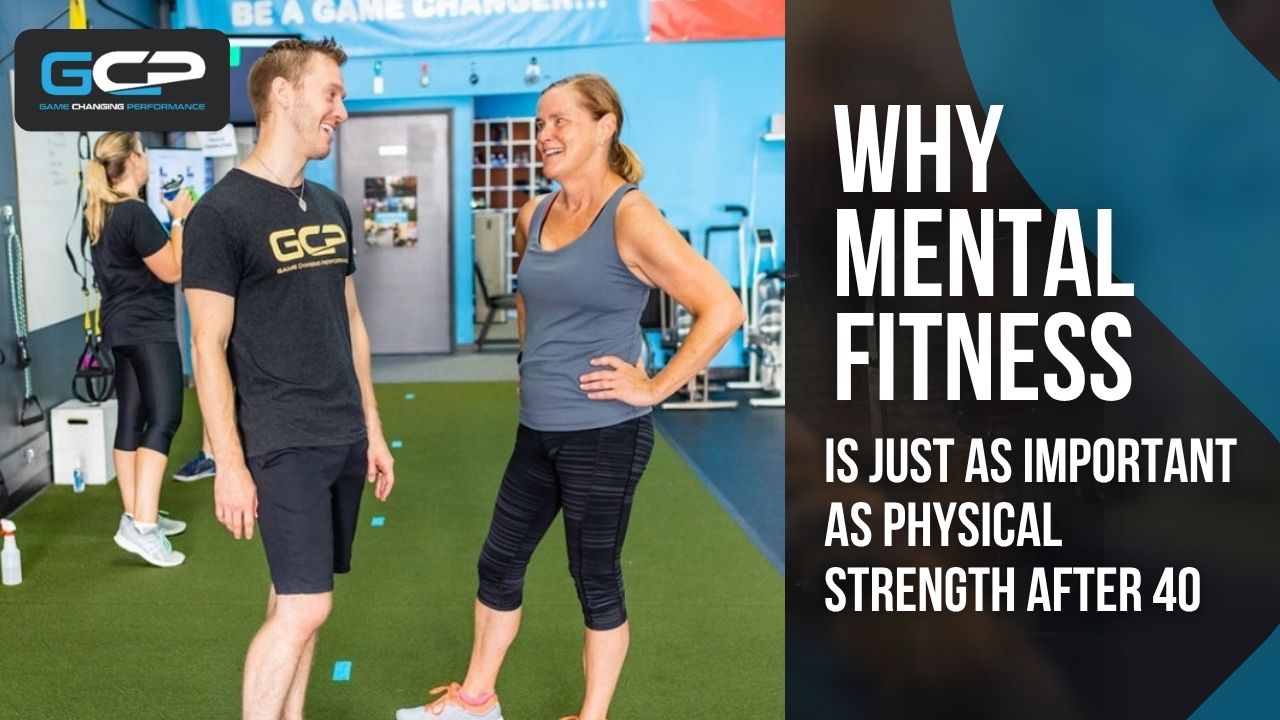
hy Mental Fitness After 40 Matters, Game Changing Performance
Why Mental Fitness Is Just as Important as Physical Strength After 40
As we cross 40, many of us feel mental fatigue, brain fog, mood swings, or stress dragging down performance, and I used to pretend I was okay when I wasn’t. Attention: This wasn’t just “getting older”; it was a warning sign that mental fitness after 40 was slipping, and it threatened my goals, relationships, and self-worth.
What I learned (and now teach through Game Changing Performance) is how strong mental fitness after 40, paired with mindset coaching after 40 and emotional health and fitness habits, restores clarity, energy, confidence, and sustainable strength for the long run.
Why Mental Fitness After 40 Becomes Critical
Turning 40 often brings new pressures, career demands, family responsibilities, and health changes that test your resilience. That’s why building mental fitness after 40 isn’t just helpful, it’s the foundation for staying strong, focused, and fulfilled in every area of life.
1. The statistical reality of mental health
Recent data shows that mental health challenges are rising sharply among adults over 40, affecting focus, motivation, and overall well-being. These statistics highlight why prioritizing mental fitness after 40 is no longer optional; it’s a necessity for lasting health and performance.
In 2024, 23.40% of U.S. adults experienced any mental illness (over 60 million) (Mental Health America).
Many never get help: only about half of adults with mental health challenges receive treatment (NAMI).
As we age past 40, life stressors often accumulate, including work pressure, family demands, and health changes, making stress management over 40 essential.
These numbers show that declining mental fitness isn’t rare, it’s common. And for adults over 40, ignoring it is risky.
2. Why mental fitness after 40 and physical strength alone aren’t enough
You already know strength training, cardio, and nutrition coaching matter. But without mental fitness after 40, you’ll hit walls:
Poor emotional regulation hurts consistency and motivation.
Anxiety and stress undermine recovery and sleep.
A weak mindset blocks sustainable habits and resilience training over 40.
In other words, physical fitness is necessary, but mental fitness after 40 is the foundation that lets you stay consistent, bounce back, and grow.
3. Elements of Mental Fitness After 40
Building mental fitness after 40 means strengthening not just your body, but your mindset, emotions, and cognitive agility. It’s about developing daily habits that keep your brain sharp, your mood steady, and your motivation unshakable.
3.1 Brain Health Exercises & Cognitive Fitness Strategies
Just like your body needs regular workouts to stay strong, your brain thrives on consistent training too. You can “train” your brain just like muscles. Here’s how to start:
Dual-task drills: combining movement and cognitive tasks (e.g., reciting names while stepping).
Puzzles, memory games, strategy games.
Learning a new language or musical instrument.
These brain health exercises improve processing speed, working memory, and neural plasticity, all key to thriving in midlife.
4. Resilience Training Over 40 & Positive Mindset for Aging
Stress is an inevitable part of life, especially after 40, when responsibilities multiply. What truly defines your strength isn’t avoiding stress; it’s how you choose to respond to it.
Practice reframing challenges: “What can I learn?”
Use setbacks as feedback, not proof of failure.
Cultivate grit through small daily challenges (cold showers, fasting, or holding discipline).
A positive mindset for aging changes the entire narrative; it reminds you that life after 40 is full of potential, not limitation. It helps you see this chapter as a powerful phase of growth, learning, and renewed purpose rather than decline.
5. Mindset Coaching After 40 & Wellness Coaching for Adults
Sometimes, no matter how driven you are, progress feels stuck or unclear, and that’s perfectly normal. That’s where coaching comes in: to guide, support, and help you rediscover your direction with purpose and confidence.
Mindset coaching after 40 helps you uncover limiting beliefs (I’m too old, I’m done) and replace them.
Wellness coaching for adults provides structure, accountability, and holistic support (nutrition, sleep, stress).
Athletes over 40 who use mindset coaching often report better consistency, confidence, and balance.
6. Building Emotional Health and Fitness for Midlife

As you navigate midlife, emotional stability becomes just as vital as physical strength.
Building emotional health and fitness helps you manage stress, stay grounded, and maintain balance through life’s constant changes.
6.1 Daily Self-Care Routines & Mindfulness Practices
The little things you do each day shape your emotional and mental strength far more than you realize. Small habits add up over time. Try incorporating these simple yet powerful practices:
Morning journaling or gratitude (5 minutes).
Short mindfulness or breathing breaks midday.
Evening reflections on lessons, not regrets.
These mindfulness practices act like a reset button for your mind, helping you pause, breathe, and regain balance. They support deeper emotional regulation, sharper clarity, and stronger resilience against daily stress.
6.2 Work-Life Balance Over 40 & Sustainable Habits
As you cross 40, life’s pace often accelerates, and juggling work, family, and self-care can feel overwhelming. That’s why maintaining balance becomes more critical than ever to protect your energy, focus, and overall well-being.
Set boundaries around work hours, screen time, and rest.
Prioritize “off” time: nature, reading, loved ones.
Use sustainable habits (not extremes), habits you can keep for decades.
A holistic fitness approach connects your mental, physical, and emotional health into one sustainable system. Over time, this alignment helps you perform better, feel more balanced, and live with greater purpose.
7. Process Table: How to Develop Mental Fitness After 40 (6-Step Process)
Developing mental fitness after 40 isn’t about drastic change; it’s about small, consistent steps that build lasting strength. This 6-step process gives you a clear, practical path to sharpen your mind, boost resilience, and stay mentally strong for life.
1, Step
1
2
3
4
5
6
2, Focus
Assessment
Cognitive drills
Daily routines
Resilience drills
Review & adjust
3, Action
Identify your biggest stressors, mindset blocks, and emotional patterns
Choose 2 brain health exercises per week
Engage in group mindset coaching after 40 or peer support
Build self-care routines, mindfulness practices
Add small challenges (cold, fasting, discipline tasks)
Monthly review of what's working, what’s not
4, Benefit
Awareness
Improves focus & memory
Accountability & perspective
Emotional regulation
Grit & confidence
Long-term adaptation
Think of that table as your personal roadmap, a guide that evolves with your journey and goals.
Use it wisely, stay flexible, and keep your approach realistic so progress feels achievable, not overwhelming.
8. How Mental Fitness Boosts Physical Fitness
When your mind is sharper, your actions become more focused, intentional, and consistent. That’s when real, lasting results begin to show, in your workouts, work life, and overall well-being.
Strong emotional health and fitness help you push harder in training without burnout.
Better stress management over 40 improves hormone balance, recovery, and sleep.
Mental strength training sharpened your focus, your nail technique, form, and consistency.
One study found regular exercise reduced poor mental health days by over 40% (UCLA Health).
Your body and mind are deeply connected; one fuels the progress of the other. That’s why physical gains and mental fitness after 40 always go hand in hand, creating true long-term strength.
9. Mindset Coaching and Psychology of Fitness After 40
In most cases, the real barrier isn’t your age, time, or energy; it’s what’s happening in your mind. That’s exactly where coaching helps: guiding you to break mental blocks and build lasting inner strength.
Identifying limiting beliefs (I’m “too old,” “past my peak”).
Rewiring self-talk, confidence building, and discipline.
Aligning goals with inner values (purpose, legacy).
Understanding the psychology of fitness after 40 makes your conditions, age, fatigue, and obligations, not excuses but parameters you work within.
10. Cognitive Fitness Strategies and Focus Training for Adults Over 40
As we age, maintaining sharp focus and quick decision-making becomes just as important as physical stamina. That’s why cognitive fitness strategies are a game changer for mental fitness after 40; they keep your brain alert, adaptable, and resilient in any situation.
Here are a few effective focus and clarity exercises to strengthen your mental edge:
5-Minute Attention Drills: Practice focusing on one sound, breath, or movement to train deep concentration.
Visualization Training: Before workouts or big meetings, mentally rehearse success to build motivation and discipline.
Memory Recall Games: Use apps or simple word chains to improve short-term memory and neural speed.
Digital Detox Moments: Step away from screens daily to restore mental calm and clarity.
These small practices nurture focus and clarity exercises, helping you handle pressure, reduce distraction, and stay mentally sharp. Over time, they reinforce your long-term lifestyle change, ensuring that your mental fitness after 40 stays strong well into the decades ahead.
Conclusion
If you’re over 40, you probably stay active and push yourself physically, but deep down, stress, burnout, or loss of focus might still hold you back. The truth is, your body can only go as far as your mind allows, and that’s where most people struggle.
Fast forward to your next chapter, when you start building mental fitness after 40, you’ll regain clarity, consistency, and control in every area of your life. Game Changing Performance is built to help you make that shift with proven strategies, mindset tools, and supportive coaching.
Remember, mental fitness isn’t optional; it’s essential. You already have the roadmap to grow stronger both mentally and physically.
You’re not alone in this journey; your best years start right now.
Frequently Asked Questions
What is mental fitness, and why is it important after 40?
Mental fitness means resilience, clarity, emotional balance, and cognitive strength. After 40, it supports consistency, growth, and flourishing alongside physical health.
How does mental health affect physical fitness results?
Poor mental health can sap motivation, interfere with recovery, disrupt sleep, and lead to injury, undermining physical gains.
Can mindset coaching improve workout consistency?
Yes. Mindset coaching after 40 addresses internal blocks and provides accountability, which enhances consistency and yields better results.
Why is stress management crucial for adults over 40?
Chronic stress raises cortisol, disrupts hormones, impairs recovery, and accelerates aging, so mastering stress is nonnegotiable.
What mental fitness practices does GCP recommend?
At Game-Changing Performance, we utilize cognitive drills, resilience challenges, mindfulness practices, coaching, and sustainable daily routines.
How can mindfulness improve strength training outcomes?
Mindfulness improves focus, reduces mind wandering during lifts, helps with recovery, and regulates emotions when things get tough.
Does mental fitness help with weight loss motivation?
Absolutely, when your mindset is sharp, you stick to nutrition discipline, avoid emotional eating, and stay committed.
Can building mental fitness improve confidence after 40?
Yes, with repeated wins over self, you build self-trust. Confidence becomes natural, not forced.


